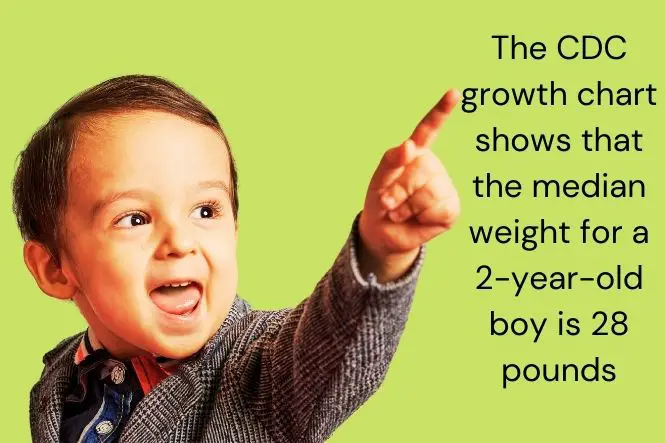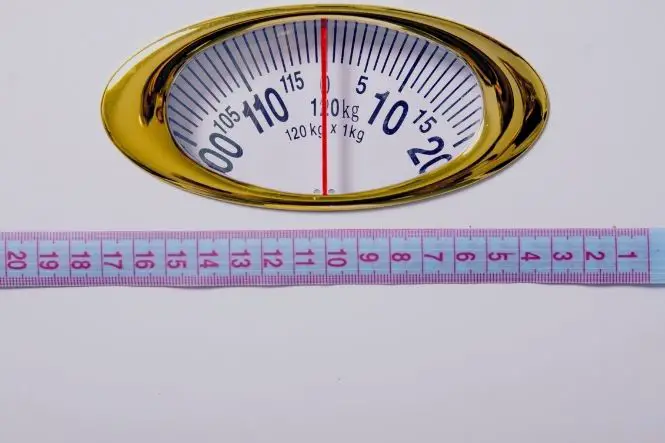While weight for toddlers can range based on several factors, there are guidelines that you can use to evaluate your toddler’s weight. The Centers for Disease Control and Prevention (CDC) suggest that growth charts are used by healthcare providers to monitor a child’s growth–you can also use these to see how your child’s weight compares to other children of the same age. It is important to note that growth charts are only one aspect of determining a child’s overall health and well-being and they should be considered in the context of other contributing factors.
There are two different growth charts that can be used to evaluate your toddler’s weight: these are the CDC growth charts and World Health Organization (WHO) growth charts. The CDC growth charts can be used to evaluate your child’s weight from the age of 2 years and up, while the WHO charts begin at birth and go up to 24 months. Toddlerhood is generally described as the age range between 12 months and 3 years of age, so depending on the age of your child, you can determine which chart is most suitable.
For 12-month-old boys, the WHO growth chart shows that the median weight is around 21 pounds. This means that half of 12-month-old boys weigh less than 21 pounds and half weigh more than that. For girls, the median weight is about 19.5 pounds. These charts also show that only five percent of boys this age weigh less than 17 pounds and five percent of girls weigh less than 15.5 pounds. On the opposite end of the spectrum, only five percent of boys weigh more than 26.5 pounds and five percent of girls weigh more than 25.5 pounds.
Table of Contents
What Is The Average Weight For A 2-Year-Old?
The average weight of a 2-year-old child can be determined by looking at either the CDC growth charts or the WHO growth charts. Each organization has different charts based on the sex of the child. When reviewing these charts, remember that they do not take into account factors such as premature birth or medical conditions. If you have any concerns about your toddler’s weight, contact your healthcare provider.
The CDC growth chart shows that the median weight for a 2-year-old boy is 28 pounds, with half weighing more than that and half weighing less. Five percent of 2-year-old boys weigh under 23 pounds–if your child falls in this category, it could be an indication that they are underweight. Similarly, five percent weigh over 33 pounds–if your child weighs more than this, they might be considered overweight.

For 2-year-old girls, the CDC growth chart shows that the median weight is 26 pounds. Around five percent of 2-year-old girls weigh less than 22 pounds, while five percent weigh more than 32 pounds. Note that the weight of a toddler is somewhat dependent on their height, so take this into consideration when evaluating your child.
How Much Should A 3-Year-Old Weigh?
You can consult the CDC growth charts to see what other children who are 3 years old weigh. Keep in mind that weight is dependent on different factors including height, any medical conditions, and whether or not your child was born early or late. If you have concerns that your child might be overweight or underweight, discuss this with your healthcare provider.
According to the CDC growth chart, the median weight for a 3-year-old boy is 31 pounds. On the high end of the scale, about five percent of boys this age weigh over 38 pounds. Conversely, five percent of 3-year-old boys weigh less than 26 pounds. For 3-year-old girls, about half weigh more than 30 pounds and half weigh less. About five percent weigh under 25 pounds, while five percent weigh over 38 pounds.
Most toddlers will gain about 4-5 pounds in their third year of life. Some children gain this weight fairly rapidly if they are in the midst of a growth spurt. Other kids have this weight gain spread out pretty consistently over the whole year. So long as your toddler is gaining weight at a regular pace, falling within the guidelines of the growth charts, and remaining physically active, there is usually no cause for concern.
Why Is My Toddler Not Gaining Weight?
If a toddler is not gaining weight as quickly as expected, it can be concerning and worrisome for a parent. The good news is that the vast majority of toddlers who are not gaining weight simply need to eat more. Very few toddlers who don’t gain weight actually have some type of medical condition that interferes with their growth. Of course, it is always recommended that you check in with your healthcare provider if you have concerns.
Since toddlers tend to be incredibly active, it can be easy to underestimate the amount of food that they need to sustain them. Depending on the age and development of your child, they may not have the vocabulary to communicate that they are hungry. If your toddler is not gaining weight, start offering more food at meal times and offer healthy snacks snacks throughout the day. Getting your child involved with the preparation of food can help as well–have them pick out healthy foods at the grocery store and help with age-appropriate tasks in the kitchen.
Some children have sensitivities to certain foods or to the texture of some foods which can make it seem like they are being picky. Toddlers who have autism, for example, frequently have food aversions. If it seems as though your child eats an adequate amount of food, but still is not gaining weight, it is possible that they have a medical issue that is contributing to their lack of growth. This may be a gastrointestinal disorder like celiac disease or a problem with their kidneys or thyroid.
How Do I Know If My Toddler Is Eating Enough?
It can be challenging to know if your toddler is getting enough food in their diet but there are some steps you can take to increase the likelihood of them doing so. It is important with toddlers that you don’t turn eating into a power struggle as this can have long-term repercussions related to food habits.
While it can be stressful to make sure your toddler gets the right amount of food and nutrients, do your best to make food an enjoyable experience for the whole family. Focus on providing healthy foods for your toddler–encourage the consumption of natural, whole foods instead of prepackaged foods that are usually loaded with sugar, salt, and unhealthy fats.
Provide options for your toddler, within reason–if you are making a salad to go with dinner, have them choose what kind of vegetables to put in it. Homemade smoothies are another great way to get calories and nutrients into your child and kids usually love drinking them.
Final Thoughts
Using the CDC or WHO growth charts can be a great starting point for evaluating the weight of your toddler. The average weight for a 2- or 3-year-old will depend on various factors and parents should consult their healthcare provider if they have concerns. Modeling a positive attitude toward eating and nutrition will benefit your toddler as they grow and develop.






